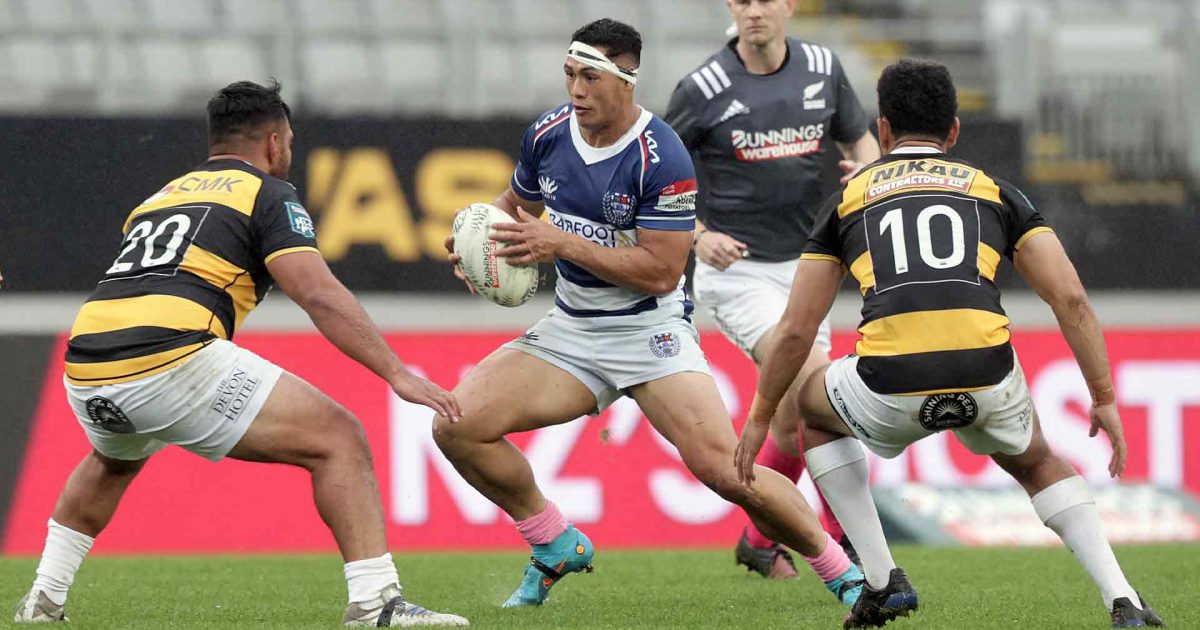Stephen Perofeta impresses at No 10 as Roger Tuivasa-Sheck shifts roles

Two All Blacks have accrued some much-needed play-time in Saturday night’s NPC clash between Auckland and Taranaki.
Stephen Perofeta lined up for No 10 for Taranaki while the home side had Roger Tuivasa-Sheck at their services – but not in his customary midfield role.
While Tuivasa-Sheck has previously made all his starting appearances for the Blues and Auckland at second five-eighth, he was somewhat surprisingly enlisted on the wing on Saturday evening, potentially hinting at a positional change for the national side.
Tuivasa-Sheck has made two fleeting appearances for the All Blacks this year, clocking up a collective 20 minutes against Ireland and Australia. Both those appearances were in the midfield, with the 29-year-old replacing Blues teammate Rieko Ioane for his debut and Jordie Barrett in his most recent appearances against the Wallabies last weekend.
Before Tuivasa-Sheck made the switch to rugby union following a decorated 10-year career in the 13-man code, pundits were split over the best position for the fleet-footed league outside back.
“Our dialogue has been minimal around that type of thing,” said Blues coach Leon MacDonald when Tuivasa-Sheck was first recruited. “He gives us versatility. He played schoolboy rugby in midfield, and has been playing his league in the outsides. One of the attractions for us is he is a multi-skilled player and provides options.”
While cross-code star Sonny Bill Williams suggested his former teammate might initially suit a role on the wing or at fullback, MacDonald confirmed ahead of the 2022 Super Rugby Pacific season that they would be employing Tuivasa-Sheck in the midfield.
“I think he looks good there, he looks really good there,” MacDonald said.
“He likes being in the middle of the play, he likes to have the ball in his hands. He’s able to take the line on, which he enjoys, and he loves the physicality, so he’s enjoying the defensive side of it as well.”
That’s exactly where Tuivasa-Sheck has lined up since making the transition to union – until Saturday night, where he looked comfortable in the No 14 jersey as Auckland bounced back from a 17-3 deficit to record a sizeable 38-24 win over Taranaki at Eden Park.
Perofeta, on the other hand, has regularly swapped between first five and fullback but has had precious little minutes in the former role this year since spending much of the Blues campaign at No 10.
In fact, Perofeta has managed just four appearances since Super Rugby Pacific came to an end, including a minute of action for the All Blacks in their loss to Argentina.
Back in his favoured role against Auckland, Perofeta was in superb form, sparking all three of the visitors’ tries.
Perofeta’s explosiveness wasn’t enough to help his team to a victory, however, with the Auckland forwards taking control of proceedings in the second spell and powering their side to a strong victory ahead of next weekend’s play-offs, where they will take on North Harbour.
The defeat means Taranaki will finish the season with just three wins, marking a massive fall from grace for the Bulls who went undefeated through last year’s campaign.











































































